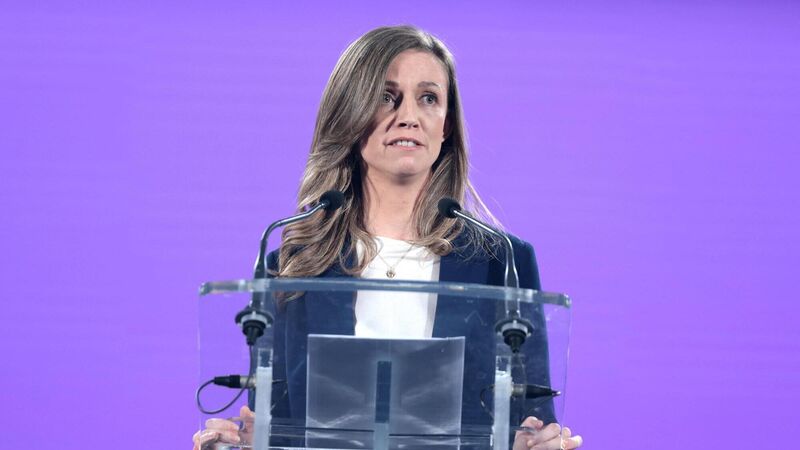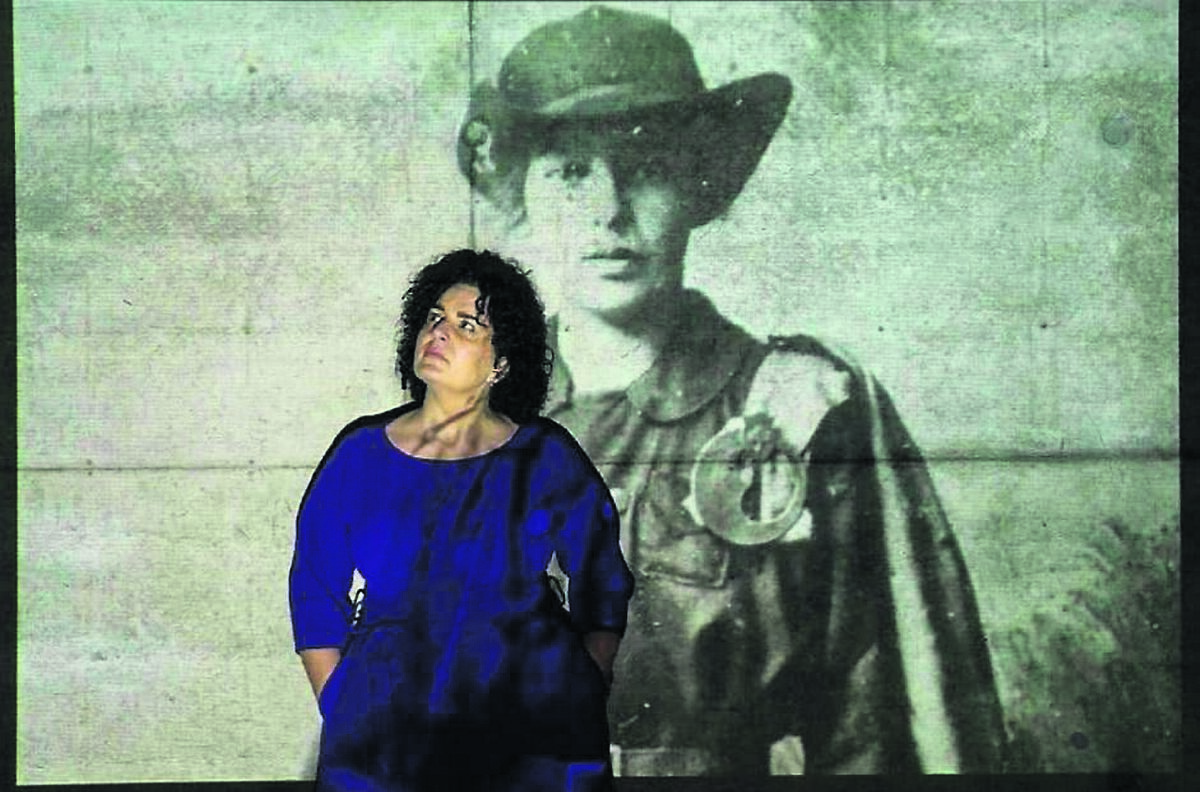Why we are voting Yes, Yes in the upcoming Referenda

Party leader Holly Cairns at the Social Democrats National Conference. Picture: Leah Farrell / © RollingNews.ie
Holly Cairns, Leader of the Social Democrats (TD for Cork South West)
In the coming weeks, we will have the opportunity to vote on two important – and long overdue – changes to our Constitution on family and care.
Making changes to our Constitution is not something we should ever take lightly. However, after giving the issue careful consideration, the Social Democrats are urging people to vote Yes to both questions on March 8.
The first referendum relates to the definition of a family in our constitution. The current wording only recognises a family as one that is based on marriage. This does not reflect the reality of Ireland today, and does not recognise or protect a huge proportion of families in Ireland.
Statistics show that 40% of families have non-married parents, be it in the form of co-parenting, single parents, or those that have been widowed.
Marriage does not make a family. It is the relationships, the actions, the love and the care between people that form a family unit.
Voting for this change will not in any way undermine the value of marriage or traditional family structures. Instead, it would acknowledge and validate the many forms of family that exist in modern Ireland.

At the end of the day, we all want this amendment to result in every family in Ireland – in every shape and size they come in – to feel equally represented and protected by their constitution.
The current wording should never have made its way into our Constitution in the first place – and it is high time it was changed.
The second referendum we will vote on relates to care, and the removal of the notorious ‘women in the home’ section of our constitution.
To put it bluntly, the current wording in the Constitution is outdated, patriarchal and insulting. It does not represent reality, it does not represent all women, and it needs to change.
An overwhelming majority of full-time carers are women – 98%, in fact. Unbelievably, 299,000 are unpaid for the tireless work they do.
Caring responsibilities can make it extremely difficult for women to progress in their careers. The need for flexibility, part-time hours, and the implications of taking long career breaks to care for loved ones, means that women are overrepresented in precarious and low paid employment.
Every single carer provides an essential service to this State. We owe them an enormous debt of gratitude. But, incredibly, the State does very little to support them or acknowledge the significant contribution they make to Irish society.
From lack of respite services to the absence of a public and affordable childcare model, the State often does the exact opposite and makes life actively difficult and expensive for carers.
It’s important to acknowledge that the wording the Government has chosen to replace this provision with is not strong enough. The Social Democrats had argued that the proposal on care should have been more ambitious. In our view, the language lacks substance and limits constitutional protection of care to care within families – and not the wider community, as recommended by the Citizens’ Assembly on Gender Equality.
Referendums should not be merely symbolic – changes to our Constitution should have legal weight and be of practical support.
My party had proposed alternative wording which would have recognised forms of care taking place outside of the home, as well as putting an obligation on the State to support carers. Instead, under the proposed new wording, the Government will ‘strive’ to support carers. This means there is no explicit requirement on the Government to provide practical or financial support to carers. While this is not as strong a step forward for carers as I would have liked, it is an improvement on the current wording of the constitution. Maintaining the status quo is not in anybody’s interest.
It is essential that the State recognises the right of disabled people to live independent lives. Having proper access to care and services outside the family is integral to that.
The Government could also signal its intention to respect and defend disabled people’s rights by immediately ratifying the Optional Protocol to the UN Convention on the Rights of Persons with Disabilities.
Voting Yes-Yes on March 8 will be a step in the right direction. But if we really want to provide the necessary supports for carers and proper services for people with disabilities in Ireland, it is clear that we need more than a symbolic sentence in our constitution – we need a change of approach and, ultimately, a change in Government.

WHY I AM VOTING YES
MaryRose Desmond, Chair of the Women’s Caucus on Cork City Council, and Fianna Fail Councillor, Cork City South East
As International Women’s Day approaches, we stand on the brink of a meaningful opportunity to make real change for women and carers in our society. Growing up in a family deeply influenced by the character and fortitude of my mother and grandmother, I’ve witnessed first-hand the importance of recognising that women can play any role they choose in society. Now, it’s time for our Constitution to reflect this reality.
The proposed thirty-ninth and fortieth amendments to the Constitution, to be voted on Friday, March 8, aim to provide for what is the current day reality and modern concept of the family, remove outdated language on a woman’s place in the home, and introduce a new article recognising the care and support provided by family members to one another.
While past referendums, notably those on marriage equality in 2015 and Repeal the 8th in 2018, sparked significant social movements, the importance of the referendums on March 8 cannot be understated.
They hold the potential to fundamentally reshape our understanding of the family unit in society and acknowledge that it comes in a variety of shapes and sizes.
Some will argue that these referendums won’t change anything for women, families, or carers, but this assertion misses the mark. These amendments have the power to dramatically transform societal norms and attitudes toward family dynamics, and modernise our Constitution to stay apace with these changes.
When Éamon de Valera and the framers of the 1937 Constitution drafted its provisions, they recognised the necessity of creating a living document adaptable to modern times. Article 46, which allows for the amendment of the Constitution, reflects their forward-thinking approach and an understanding that society could never just stand still, frozen in the era of the 1930s when Ireland had a marriage bar and war was on the brink in Europe. Society is ever-evolving, and our Constitution must evolve with it.
By voting ‘Yes’ to both amendments, we will affirm a broader concept of family beyond marriage alone, discard outdated gender roles, and acknowledge the diverse ways in which care is provided within families.
While these changes may not evoke the same impassioned reaction as previous referendums, they hold the potential for life-altering impacts on those affected by the outdated and archaic language still present in our Constitution.
It is over 50 years since the State acknowledged in practice that families are not just based on marriage. The creation of a dedicated social support for lone parent families reflected this. However, it is crucial to say that this will not diminish the meaning of marriage. Marriage is an important institution that will still be protected, but it is not and should not be the sole means of defining what is and is not a family.
The most recent data from the CSO labour force survey reveals that 70.5% of women of working age are currently engaged in either full or part-time paid employment. This is the highest level recorded since the survey commenced in 1998. At the same time, there are also women who contribute their strength and dedication to our society in roles which are often seen or categorised as traditional. Nothing should ever be done to disrespect that.
That is precisely why the Government is proposing to update our constitutional wording to remove any doubt – a woman’s place is wherever she wants it to be. In fact, the core challenge for us all is to move away from stereotypes that confine individuals to predefined roles based on gender and to foster genuine respect for the diverse choices people make.
Similarly, to restrict our focus solely on the care of children in the home is to adopt a narrow perspective on care-giving within our society. Care extends beyond nurturing children to encompass the support of elderly relatives, people with disabilities, and those battling serious illnesses – an everyday reality in thousands of households across the nation.
This amendment to the Constitution will broaden the concept of care and underscore the respect and value we place on caregivers, irrespective of gender, while acknowledging the State’s role in providing support for this care. The current wording of the Constitution needs to change if we are to show all families the respect which they deserve.
At 87 years old, our Constitution must remain a living, breathing document that reflects the values and realities of contemporary society. That’s why, this International Women’s Day, with the theme to ‘Inspire Inclusion’, I will proudly cast my vote in favour of both referendums. At the heart of it, these amendments are about more than just legalities; they represent a collective endeavour to build a more inclusive and equitable society – one where every individual, regardless of gender or caregiving role, is afforded the dignity and respect they deserve.







 App?
App?


